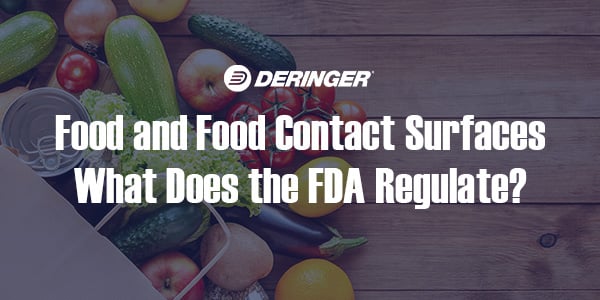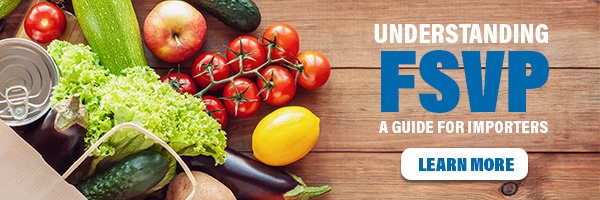
What do cheese pizzas, closed-face sandwiches, cans, rabbits, and table salts have in common? They are all regulated by the FDA.
The FDA has strict rules on food and food-related items for human or pet consumption. Before importing food or items that touch food into the U.S., it is beneficial for importers to answer the following questions:
- Does the FDA oversee the goods?
- Is the product a food or food contact substance for animals or humans?
- Is the product a dietary substance?
- Is the product human or animal drugs, a medical device, a tobacco product, a cosmetic, or an electronic product that emits radiation?
- Is the HTSUS number flagged for FDA?
The answers to these questions will determine what is needed to import food and food contact surfaces. Importers who follow all required steps can avoid costly audits, inspections, and delays.
What Does the FDA Regulate?
Being aware of the FDA’s definition of food and food contact surfaces (FCS) will assist in the import of these goods.
The FDA defines food as “an article that is used for food or drink by man or animal, chewing gum or articles used by food or animals.”
An FCS is any item that comes into direct contact with food, which includes coatings, plastics, paper, adhesives, colorants, antimicrobials, and antioxidants. Notification must be submitted to FDA prior to marketing an FCS. If this process is already completed, each importer does not need to do it again.
The FDA isn’t the only agency that regulates food. The following government agencies also oversee food imports:
- Food Safety and Inspection Service (FSIS)
- Fish & Wildlife Service (FWS)
- Animal and Plant Health Inspection Service (APHIS)
- Agricultural Marketing Service (AMS)
- United States Department of Agriculture (USDA)
- National Organic Program (NOP)
Each agency has its own rules and requirements. For example, FSIS requires import certificates, while the Fish & Wildlife Service requires permits. Importers must know and adhere to all rules that apply to their shipments.
What Legislation Governs Food Imports?
Three pieces of legislation govern the FDA’s ability to regulate food imports entering the U.S.:
- The Bioterrorism Act
- The Food Safety Modernization Act (FSMA)
- The Foreign Supplier Verification Program (FSVP)
Bioterrorism Act
Congress passed the Public Health Security and Bioterrorism Preparedness and Response Act (the Bioterrorism Act) in 2002 to protect the public from threatened or actual terrorist attacks on the U.S. food supply or other food-related emergencies. This legislation makes it mandatory for food importers to register with the FDA and give prior notice of any shipments.
Food Safety Modernization Act
In 2011, Congress passed the Food Safety Modernization Act (FSMA). FSMA shifted the focus from responding to food-borne illnesses to preventing them. FSMA requires any facility that manufactures, processes, packs, or holds food for consumption to register with the FDA, which can inspect food facilities as needed.
With registration, food facilities agree to FDA inspection. Companies must renew their registration annually. If the FDA believes the food produced has a high chance of leading to dangerous health issues or death, it can revoke registration.
FSMA also requires prior notice of food shipments arriving in the U.S. To file prior notice, importers need:
- FDA product code and registration number
- Packaging information
- Name and address of the shipper, manufacturer, consolidator or grower, owner, FDA importer, prior notice submitter, and ultimate company
- Report countries that have refused shipments of the same food products
- U.S. agent for the facility
A Customs broker like A.N. Deringer, Inc. can help foreign food facilities register with the FDA and designate a U.S. agent for the facility.
Foreign Supplier Verification Program
The Foreign Supplier Verification Program (FSVP) requires importers (the U.S. party receiving the product) to verify that their foreign food suppliers meet FDA safety standards. This verification ensures food is not adulterated or misbranded.
Importers must submit the name of the qualified individual and all contact information with every entry. A U.S.-qualified individual performs all FSVP-related activities, including the following:
- Develop FSVP
- Conduct hazard analysis
- Evaluate risks posed by food and performance of the foreign supplier
- Approve a foreign supplier
- Foreign supplier verification activities
- Corrective actions
- Maintenance of records, which is expected in an FDA audit
FDA Top 10 List
To accurately record imported food and FCS products with the FDA, importers or their Customs brokers must provide the FDA with this data on every commercial invoice.
- Is the food frozen, fresh, or shelf stable?
- FCE/SID and dimensions. The FDA requires Food Canning Establishment Registration (FCE) or U.S. FDA Process Filings (SID) and packaging dimensions. Acidified and low-acid canned goods also have special filing requirements.
- Manufacturer. The FDA must know the product’s actual manufacturer, including the name and address.
- FSVP importer. The FDA requires complete FSVP information on certain products, including the facility’s name, address, and DUNS number and the name, phone number, and email address of the FSVP contact.
- Quantity reporting. The FDA wants details about specific quantities of the product, from the largest to the smallest unit. For a can of soup, for example, the FDA wants to know the number of boxes holding a certain number of cans and how many ounces are in each can.
- Description. A good description is not a product or brand name. A clear commercial description is more specific, i.e., tomato soup versus Campbell Soup.
- MID/Registration Number. This information is needed from all shippers, exporters, and manufacturers of food products.
- Type of packaging. Record the packaging that actually touches the product.
- Tariff Number.
- Product Code.
The more complete this information is, the quicker food products and FCS move through Customs and into the U.S.
What Actions Can the FDA Take?
Most food importers cannot escape an eventual FDA audit or review. But they can do their part to keep accurate records and quickly respond as needed.
Checking the Import Trade Auxiliary Communications System (ITACS) lets companies see the status of their shipments. Here, they may track the following FDA notifications for their shipments.
- May proceed. The products can enter the country immediately.
- Under review or hold. The FDA is examining or sampling the goods. With these notifications, importers will want the party receiving the goods to hold them. If they do not, they could face a pricey re-delivery in the future.
- Notice of Action. The FDA issues these notices when it does something with the goods, such as sampling. The FDA will continue to issue Notices of Action until goods are allowed entry or blocked access.
Pay attention to FDA import alerts, as these can slow down imports. The FDA issues import alerts when there is an inherent risk in the product, country of origin, or a manufacturer with a bad track record. The FDA website lists all import alerts related to food.
Importing food and FCS into the U.S. comes with great responsibility and regulation. The FDA regulates these products to protect the health of people and animals, and upholding the laws and regulations is vital.



